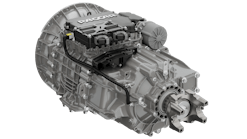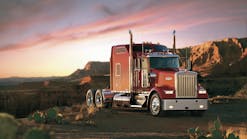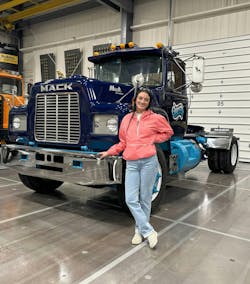A piece of trucking history has a new home at the Mack Trucks Historical Museum thanks to the dedication of Grayce Emmick, an eighth-generation farmer and restoration enthusiast.
The newly restored 1984 Mack R Model, originally custom-built for Johnny Prescott and Son Oil—a supplier of home heating oil, propane, and diesel fuel based in Concord, New Hampshire—represents both Mack’s legacy and a personal journey for its restorer.
“I've always preferred older trucks over new, and to me there is nothing cooler than an old dog that looks new,” Emmick said in a news release. “Growing up around Mack trucks made it easy to fall in love with the brand. The first Mack I sat behind the wheel of is a 1985 R Model that has been on our farm since 1992.”
The year-long restoration project balanced preserving historical elements while adding modern touches. The truck maintains its original steering wheel cap, engraved with “Custom Built for Johnny Prescott Oil Co.,” and features vintage Mack bulldog mirror ornaments with distinct long ears and tail designs.
“The Mack R Model series is iconic in trucking history, creating the benchmark for American transportation from 1965 and maintaining it through the mid-2000s,” said Doug Maney, curator of the Mack Trucks Historical Museum. “The fact that our trucks are not just dependable tools is reinforced by the R model, generating a source of pride for their owners. Grayce's influence and hands-on effort, preserving original details while thoughtfully modernizing others, helps us tell the story of Mack’s heritage and the evolution of trucking in America.”
The restoration began with help from several Mack supporters.
“Mack fans are loyal, dedicated, and supportive,” Maney said. “When this project was first mentioned, I had several offers from truck owners that wanted to help. Jim Rymes of J&H Rymes and Daughters in Lakewood Ranch, Florida, generously donated his truck for the base of this project. In order to get the R to Kentucky, another dedicated Mack fan, Gregg Hoffman with Underdog Transport in Bangor, Pennsylvania, donated the hauling from Florida to Grayce’s family farm for her personalization.
“The Mack brand roots itself into people just as it has American and world history.”
The project became a family and community effort, with contributions from Emmick’s partner, Gavin Spoor, and other supporters. A personal touch includes a fifth wheel from Spoor’s truck—the very vehicle that brought the couple together during a 10-hour drive from Texas.
“Mack Trucks has been an integral part of my story and being able to donate to their legacy is nothing short of empowering to me,” she said.
Maney said the museum is honored to add the truck to its collection.
“What makes this donation particularly special is how it bridges generations, combining the craftsmanship of Mack’s past with the passion of a young enthusiast who understands the importance of preserving our trucking heritage,” he said. “It will serve as an inspiring example to museum visitors of Mack’s enduring quality and the continuing legacy of our favorite brand.”
The restoration process was documented through a series on YouTube, offering viewers insight into the challenges and triumphs of bringing a classic truck back to life. Emmick’s connection to both farming and transportation runs deep. As the eighth generation of Emmick Farms, established in 1813 in Lewisport, Kentucky, she continues a legacy that spans more than two centuries. The farm, which focuses on row crops, including corn, soybeans, and winter wheat, has a unique place in American history—its riverbank once served as the site of Abraham Lincoln’s ferry business; and nearby, Lincoln won his first court case, launching his path into politics.
“Through the restoration series and seeing the end result in the museum, I hope visitors and viewers can appreciate the learning process,” Emmick said. “Nobody wants to learn the hard way, but sometimes that’s necessary to understand your limits, what you need to improve on, and how you can do better.”










